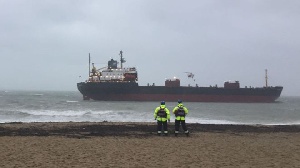- Home - News
- TWI News | TV
- Polls
- Year In Review
- News Archive
- Crime & Punishment
- Politics
- Regional
- Editorial
- Health
- Ghanaians Abroad
- Tabloid
- Africa
- Religion
- Election 2020
- Coronavirus
- News Videos | TV
- Photo Archives
- News Headlines
- Press Release
Business News of Friday, 20 March 2015
Source: B&FT
Shippers lose US$110m to demurrage and rents
Shippers who imported containerised cargo into the country last year had to cough up about US$110million to ship agents for undue grounding and detention of containers after the mandatory free periods, the B&FT has gathered.
About US$75million of the said amount covered the cost of 'seized' container boxes after the consignment had been grounded beyond the allowable seven-day free period, while the remaining US$35million was cost incurred out of the inability of importers to return containers to ship agents on time after lifting their containerised consignments from the port to the final destination -- otherwise known as rent charges.
The Ghana Shippers' Authority (GSA) says the increasing demurrage and rent charges are compelling reasons to bring into the trading regime the controversial Advance Shipment Information System (ASHI) to cut down on the charges, which impact negatively on the cost of doing business in the country.
Attempts to implement ASHI -- an electronic platform by which pre-arrival cargo information is received in advance for planning and commencement of the pre-clearance process -- has been resisted by traders and the private business community including Freight Forwarders, Ghana Union of Traders Association, Ghana Pharmaceutical Association, Ghana Chamber of Commerce and Industry, Ghana Automobile Dealers Association, Exporters and Importers Association, Food and Beverages Association, and the Customs Brokers Association of Ghana, who argue ASHI is a duplication of processes at the ports and will increase the cost of clearing goods at the ports.
But the Shippers' Authority explained that shipment information to the shipper in real-time for the pre-arrival clearance processes will help shippers to avoid the payment of demurrages.
Nonetheless, ship agents have talked of their displeasure at having to charge demurrage and rent charges on importers as compensation to cover the cost of leasing containers from container-manufacturing companies for their operations, as most shipping lines do not own containers.
At a media interaction in Tema to educate and explain to journalists the cost-triggers of their operations, they argued that demurrage and rent charges are not windfall profits or extortion but 'a mere compensation' for causing financial loss to the shipping lines by the undue delay and detention of hired containers.
Mr. Francis Mensah Abrampah, a technical advisor to the Ship-owners and Agents Association of Ghana (SOAAG), told the B&FT that shipping lines have no intention of leveraging demurrages and rent charges to boost revenue, since they lose more from container detention as compared to the compensation they get from demurrage.
"Ship owners do not own containers; they lease these containers and even pay insurance on them. That is why shipping lines give seven days free period for the importer to discharge his/her goods so they can have their container back.
"Demurrage is a compensatory charge on the importer for delaying the carrier's equipment -- the container -- beyond the agreed free period. It is not a means to make money because shipping lines, for instance, lose about US$35,000 per a day's delay at the port," he said.
Mr. Abrampah called on the key industry players, specifically the Ministry of Trade and Industry (MOTI) and the Ghana Shippers' Authority, to intensify efforts at keeping shippers well-informed about rudiments of the import and export trade.
He also asked industry stakeholders to work at putting in a concerted effort to do away with the various bottlenecks that impede attempts to streamline the clearance process.
"There is a need to keep shippers well-informed about the fundamentals of the import and export trade to avoid paying demurrages. Shipping lines lose money from not having their containers to generate more business.
"The situation is worse with refrigerated containers – reefers -- where additional charges are slapped on them in instances when the goods expire at the terminal and the importer fails to show up; we pay for the destruction cost and electricity consumption over the period, aside from the loss of demurrage income," he said.











